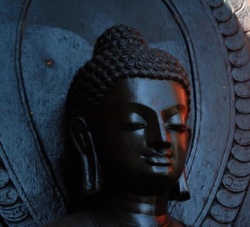Difference between revisions of "Facts and Principles"
m (1 revision: Robo text replace 30 sept) |
|||
| (6 intermediate revisions by 3 users not shown) | |||
| Line 3: | Line 3: | ||
These three basic facts of all [[existence]] are: | These three basic facts of all [[existence]] are: | ||
| − | Impermanence or [[ | + | [[Impermanence]] or Change ([[anicca]]) |
| − | Suffering (dukkha) | + | [[Suffering]] ([[dukkha]]) |
| − | Not-self or Insubstantiality (anattaa). | + | [[Not-self]] or Insubstantiality ([[anattaa]]). |
| − | The first and the third apply to the temporary and transient [[existence]], while the second ([[suffering]]) is, of course, only an [[experience]] . How ever there is a process and principle to these, in [[Buddhism]], [[nothing]] is plain or stagnant. In that [[sense]], the three are common to all that is [[conditioned]], even to what is below or [[beyond]] the normal range of [[human]] perception. | + | The first and the third apply to the temporary and transient [[existence]], while the second ([[suffering]]) is, of course, only an [[experience]] . How ever there is a process and {{Wiki|principle}} to these, in [[Buddhism]], [[nothing]] is plain or stagnant. In that [[sense]], the three are common to all that is [[conditioned]], even to what is below or [[beyond]] the normal range of [[human]] [[perception]]. |
| − | Existence can be understood only if these three basic facts are comprehended, and this not only [[logically]], but in confrontation with one’s own [[experience]]. [[Insight]] and [[wisdom]] which is the [[ultimate]] liberating factor in [[Buddhism]], consists just of this [[experience]] of the three characteristics applied to one’s own [[bodily]] and {{Wiki|mental processes}}, and deepened and matured in [[meditation]]. In [[Buddhism]], it is [[realized]] all things have a process, ground in facts and principles. | + | [[Existence]] can be understood only if these three basic facts are comprehended, and this not only [[logically]], but in confrontation with one’s own [[experience]]. [[Insight]] and [[wisdom]] which is the [[ultimate]] liberating factor in [[Buddhism]], consists just of this [[experience]] of the three characteristics applied to one’s own [[bodily]] and {{Wiki|mental processes}}, and deepened and matured in [[meditation]]. In [[Buddhism]], it is [[realized]] all things have a process, ground in facts and {{Wiki|principles}}. |
To “see things as they really are” means [[seeing]] them consistently in the [[light]] of the three characteristics. [[Ignorance]] of these three, or self-deception about them, is by itself a potent [[cause]] for [[suffering]], as it were, the net of false [[Wikipedia:Hope|hopes]], of unrealistic and harmful [[desires]], of false ideologies, false values and aims of [[life]], in which man is caught. Ignoring or distorting these three basic facts can only lead to frustration, disappointment, and despair. | To “see things as they really are” means [[seeing]] them consistently in the [[light]] of the three characteristics. [[Ignorance]] of these three, or self-deception about them, is by itself a potent [[cause]] for [[suffering]], as it were, the net of false [[Wikipedia:Hope|hopes]], of unrealistic and harmful [[desires]], of false ideologies, false values and aims of [[life]], in which man is caught. Ignoring or distorting these three basic facts can only lead to frustration, disappointment, and despair. | ||
[[File:1 500.jpg|thumb|250px|]] | [[File:1 500.jpg|thumb|250px|]] | ||
| − | Hence, from a positive as well as a negative angle, this [[teaching]] on the Three Basic Facts of [[Existence]] is of such [[vital]] importance that it was [[thought]] desirable beginning with the present [[view]] on [[Impermanence]]. [[Reality]] is incomprehensible, and a {{Wiki|principles}} understood bring forth the nature of [[reality]]. But the [[Buddha]], as a [[human being]], became the All-Enlightened One, and the [[purpose]] of [[life]] is the [[attainment]] of [[Enlightenment]]. This state of [[consciousness]], [[Nirvana]], the [[extinction]] of the limitations of [[selfhood]], is attainable on [[earth]]. All men and all other [[forms]] of [[life]] contain the potentiality of [[Enlightenment]], and the [[purpose]] therefore consists in | + | Hence, from a positive as well as a negative angle, this [[teaching]] on the Three Basic Facts of [[Existence]] is of such [[vital]] importance that it was [[thought]] desirable beginning with the present [[view]] on [[Impermanence]]. [[Reality]] is incomprehensible, and a {{Wiki|principles}} understood bring forth the nature of [[reality]]. But the [[Buddha]], as a [[human being]], became the All-Enlightened One, and the [[purpose]] of [[life]] is the [[attainment]] of [[Enlightenment]]. This state of [[consciousness]], [[Nirvana]], the [[extinction]] of the limitations of [[selfhood]], is attainable on [[earth]]. All men and all other [[forms]] of [[life]] contain the potentiality of [[Enlightenment]], and the [[purpose]] therefore consists in becoming what we are. |
Principals help us understand as that which [[causes]] the entire cycle of [[cause and effect]] , [[causes]] and [[conditions]]. How things work and why they work the way they do as a [[matter]] of fact and [[reality]]. [[Reality]] in [[Karma]] is how things work, what things do , and what are the results. | Principals help us understand as that which [[causes]] the entire cycle of [[cause and effect]] , [[causes]] and [[conditions]]. How things work and why they work the way they do as a [[matter]] of fact and [[reality]]. [[Reality]] in [[Karma]] is how things work, what things do , and what are the results. | ||
Some treat [[Karma]] as a [[metaphysical]] thing as retribution., or [[mystical]] [[fate]]. [[Karma]] [[exists]] in a series of [[actions]] and results of the [[action]] put into place and initiated. [[Ethic]] and values plays a part because everything has an [[action]] to it. | Some treat [[Karma]] as a [[metaphysical]] thing as retribution., or [[mystical]] [[fate]]. [[Karma]] [[exists]] in a series of [[actions]] and results of the [[action]] put into place and initiated. [[Ethic]] and values plays a part because everything has an [[action]] to it. | ||
In [[Buddhism]] to the system of natural laws which constitute the {{Wiki|natural order}} of things. [[Dharma]] is therefore [[reality]] as it truly is . The [[teaching]] of the [[Buddha]] constituting as it does a method of [[understanding]] [[life]] and the [[conditions]] and ways all things work. | In [[Buddhism]] to the system of natural laws which constitute the {{Wiki|natural order}} of things. [[Dharma]] is therefore [[reality]] as it truly is . The [[teaching]] of the [[Buddha]] constituting as it does a method of [[understanding]] [[life]] and the [[conditions]] and ways all things work. | ||
| − | Karma is not only [[moral]], but [[scientific]], as well as {{Wiki|social}} and many other ways of existence. | + | [[Karma]] is not only [[moral]], but [[scientific]], as well as {{Wiki|social}} and many other ways of [[existence]]. |
| − | + | [[Ultimate reality]] is unkowable because the [[truth]] is always changing and it is impossible to know and conceive everything. But true [[understanding]] of how things work can be obtain. The [[truth]] is like a [[diamond]], has many facets. | |
</poem> | </poem> | ||
[http://ichinyo.wordpress.com/2012/08/16/facts-and-principles/ ichinyo.wordpress.com] | [http://ichinyo.wordpress.com/2012/08/16/facts-and-principles/ ichinyo.wordpress.com] | ||
[[Category:Buddhist Terms]] | [[Category:Buddhist Terms]] | ||
[[Category:Pure Land]] | [[Category:Pure Land]] | ||
Latest revision as of 14:26, 30 September 2013
These three basic facts of all existence are:
Impermanence or Change (anicca)
Suffering (dukkha)
Not-self or Insubstantiality (anattaa).
The first and the third apply to the temporary and transient existence, while the second (suffering) is, of course, only an experience . How ever there is a process and principle to these, in Buddhism, nothing is plain or stagnant. In that sense, the three are common to all that is conditioned, even to what is below or beyond the normal range of human perception.
Existence can be understood only if these three basic facts are comprehended, and this not only logically, but in confrontation with one’s own experience. Insight and wisdom which is the ultimate liberating factor in Buddhism, consists just of this experience of the three characteristics applied to one’s own bodily and mental processes, and deepened and matured in meditation. In Buddhism, it is realized all things have a process, ground in facts and principles.
To “see things as they really are” means seeing them consistently in the light of the three characteristics. Ignorance of these three, or self-deception about them, is by itself a potent cause for suffering, as it were, the net of false hopes, of unrealistic and harmful desires, of false ideologies, false values and aims of life, in which man is caught. Ignoring or distorting these three basic facts can only lead to frustration, disappointment, and despair.
Hence, from a positive as well as a negative angle, this teaching on the Three Basic Facts of Existence is of such vital importance that it was thought desirable beginning with the present view on Impermanence. Reality is incomprehensible, and a principles understood bring forth the nature of reality. But the Buddha, as a human being, became the All-Enlightened One, and the purpose of life is the attainment of Enlightenment. This state of consciousness, Nirvana, the extinction of the limitations of selfhood, is attainable on earth. All men and all other forms of life contain the potentiality of Enlightenment, and the purpose therefore consists in becoming what we are.
Principals help us understand as that which causes the entire cycle of cause and effect , causes and conditions. How things work and why they work the way they do as a matter of fact and reality. Reality in Karma is how things work, what things do , and what are the results.
Some treat Karma as a metaphysical thing as retribution., or mystical fate. Karma exists in a series of actions and results of the action put into place and initiated. Ethic and values plays a part because everything has an action to it.
In Buddhism to the system of natural laws which constitute the natural order of things. Dharma is therefore reality as it truly is . The teaching of the Buddha constituting as it does a method of understanding life and the conditions and ways all things work.
Karma is not only moral, but scientific, as well as social and many other ways of existence.
Ultimate reality is unkowable because the truth is always changing and it is impossible to know and conceive everything. But true understanding of how things work can be obtain. The truth is like a diamond, has many facets.

